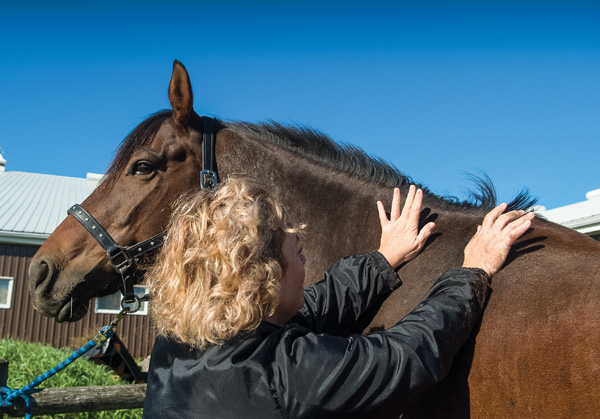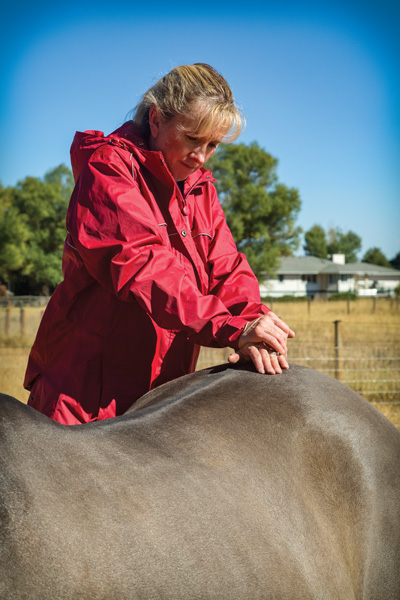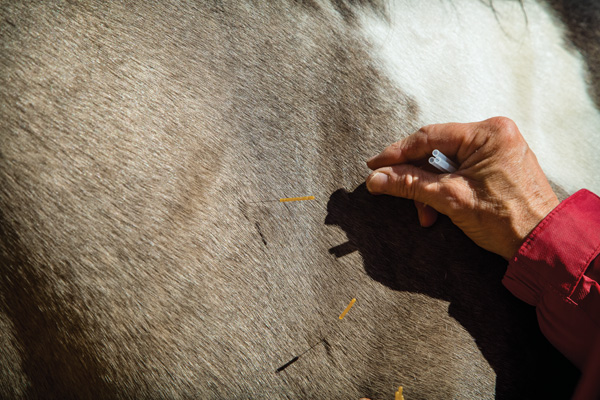When you take your horse on the road, do you find that your performance horse is sometimes not quite at his best over jumps or in the cutting pen? Does your normally energetic trail horse drag his feet an hour or two into a ride? He isn’t lame or ill, but he’s not quite at his best, either.

When you travel with your horse, you take the utmost care to ensure his health and safety. You load and unload him with care, and try to make the trip go smoothly to minimize his stress level.
[READ ABOUT: Road-Ready Tips]
But trailer travel can be hard on your horse. He’s at risk for all sorts of travel related discomforts, including muscle and tendon strains, low-level aches, fatigue, low energy, mental and physical trauma, and the overall stress of travel. Despite your best efforts, he may arrive at your destination tired, tense, stressed, and sore.
If you’ve planned an activity for the next day, you might need to take steps to help compensate for these travel effects.
Fortunately, there are therapeutic modalities that can help. Our horses, like ourselves, can benefit from forms of hands-on care that fall under the general category of “physical medicine.”
In the past, some popular and effective forms of “complementary care” were considered to be “alternative care.” Wrong! Complementary care is just that — care that complements (goes along with, adds to, makes better) regular veterinary care.
These adjunct therapies aren’t meant to replace the work of your horse’s veterinarian — regular veterinary care is essential to your horse’s health and well-being. And you should see your vet immediately if your horse shows any sign of illness, injury, or lameness.
But it might be worthwhile to ask your vet about complementary care modalities he or she might recommend for your horse and for referrals to reputable providers in your area.
Here, we’ll give you a rundown of four popular complementary care modalities: massage; chiropractic adjustments; acupuncture; and acupressure. We’ll also give you some things you can do yourself to help your traveling horse.
[READ ABOUT: Alternative Horse Health Therapies]
Equine Massage
What it is: Massage involves the application of physical pressure to the horse’s body with hands (palms and fingers); experienced professionals may also use their elbows. There are many different styles of massage, from an extremely light touch to long slow strokes to tapping or vibrating the muscles.
How it helps your traveling horse: Massage helps improve circulation; relax tight, sore muscles; and restore the normal function of leg joints and ligaments.
When to schedule it: A young, sound, fit horse might need the help of a massage professional just after travel and intermittently during multiple-day competitions. An older horse could benefit from pre- and post-travel massage, plus regular, routine appointments to help maintain his soundness and enhance his comfort level. A senior horse with more (or more severe) arthritis might need all of this plus your own gentle version of massage therapy before and after your daily rides.
What you need to know: Your veterinarian or massage professional can teach you the basics of massage to help reduce your horse’s muscle stiffness when a pro isn’t available. Use your hands only; leave the elbows and tools to the pros so you don’t accidentally misapply pressure.
[READ ABOUT: Stretches for Your Horse]
Equine Chiropractic
What it is: Chiropractic manipulations are gentle, controlled thrusts directed at the joint — not just the bones, but all related soft tissues, as well. A well-trained professional can help correct small deviations from proper alignment, but chiropractic should always be used with care.

Before making an appointment with an equine chiropractor, ask your veterinarian to perform a complete evaluation of your horse and his condition. Then ask about chiropractic, and request a personal recommendation.
Chiropractic manipulations done inappropriately, especially with force or with force-multiplying instruments, are dangerous and can cause lasting damage. Your vet can recommend someone whose methods are slow and gentle.
How it helps your traveling horse: The stresses of balancing in a trailer can cause your horse to use his muscles in unusual ways. Tight, tense, or injured muscles often pull bones slightly out of correct alignment.
When to schedule it: Whenever you and your vet feel that your horse needs it, and always in combination with massage. Massage before a chiropractic treatment can help relax, soften, and lengthen your horse’s muscles, making the treatment easier and more effective; massage after a chiropractic treatment can help ensure that the now correctly aligned parts retain their alignment.
What you need to know: Always protect your horse. If someone attempts to perform manipulations that aren’t gentle and controlled, find another professional.
Equine Acupuncture
What it is: Acupuncture is a process by which a licensed veterinary practitioner applies needles to your horse’s body in acupuncture points (called acupoints) associated with your horse’s nervous system, based on Traditional Chinese Medicine. This method of stimulating your horse’s blood flow, immune response, and energy meridians (channels) is used for both diagnosis and treatment. Again, your veterinarian will be an essential source of information and recommendations.
How it helps your traveling horse: Acupuncture can provide pain relief and help counter the travel-induced reduction in your horse’s immune response.
When to schedule it: If you’ve tried acupuncture for your horse and found it to be effective, your professional will be able to advise you on the timing and frequency of the treatment.
What you need to know: Only a licensed veterinarian can use acupuncture to treat your horse. To find a certified veterinary acupuncturist near you, contact the International Veterinary Acupuncture Society (970/266-0666; www.ivas.org). Note that a vet doesn’t have to be certified to perform acupuncture on your horse, but he or she does need to be qualified and experienced. Explore all your options.

Equine Acupressure
What it is: Acupressure involves stimulating the acupoints on your horse’s body, but it’s completely noninvasive — no needles are involved. Consider acupressure if you appreciate the effects of acupuncture, but need to help your horse when you’re away from home.
How it helps your traveling horse: A professional can help you learn how to apply acupressure to your horse at any time and for many purposes. The overall goal is to help your horse relax and become more comfortable.
When to schedule it: You might choose to schedule professional treatments to help your horse to relax just before and just after a trip. While you’re away from home, you can use acupressure yourself after you’ve learned the basic principles and key acupoints.
What you need to know: Although acupressure treatment is noninvasive, incorrectly applying pressure can still harm your horse. Learn the precise acupoints, as well as exactly how much pressure to use and how to apply it.
[READ ABOUT: Horse Acupressure]
Jessica Jahiel, PhD (www.jessicajahiel.com), is an internationally recognized clinician and lecturer, and an award-winning author. Her e-mail newsletter (www.horsesense.org) is a popular worldwide resource.
What You Can Do
If you’re on your own, without access to your veterinarian or a complementary care
professional, don’t despair. Here are several more things you can do to help your horse.
• Arrive early. Consider arriving early for your event or ride; your horse will appreciate
the chance to relax and adjust to the new surroundings. If you’ll be traveling to a significantly different altitude, give your horse several days to a week to acclimatize.
• Hand-walk your horse. Hand-walking and hand-grazing your horse might not
seem like therapy, but they’re effective methods of promoting relaxation and circulation.
• Massage your horse. If you’ve had solid instruction in massage techniques, use
them gently to improve your horse’s circulation and relaxation. You may choose to use equine massage oils or an equine liniment. Most oils and liniments used for massage simply smell nice and allow your hands to slide more easily over your horse’s body.
• Consult your vet. If your horse’s soreness persists, see your vet immediately.
While he or she examines your horse, ask about joint supplements that could help your horse in the long term.
[READ ABOUT: Equine Therapeutic Equipment]

